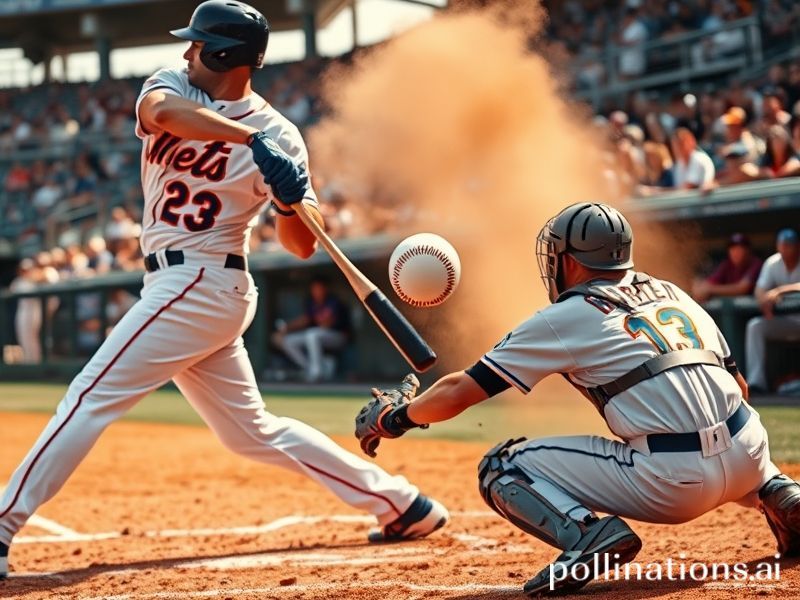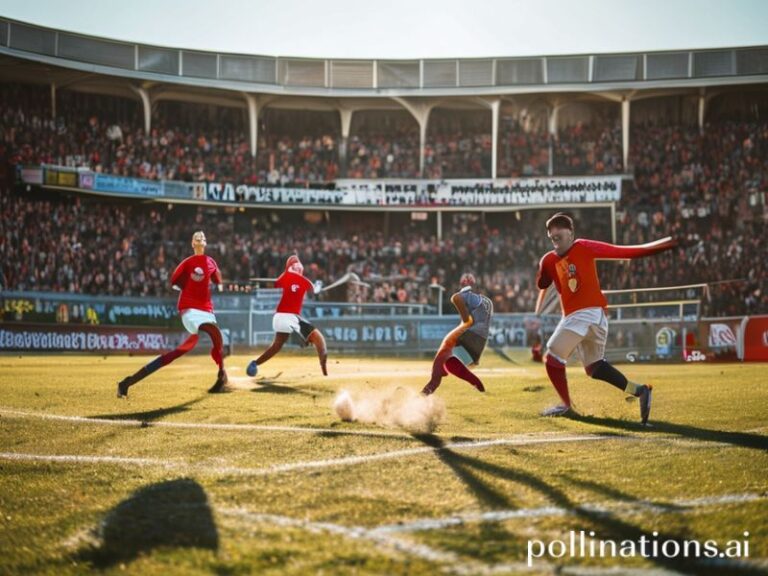Mets vs Marlins: A Global Gladiator Match for the Age of Austerity and Excess
While the rest of the planet juggles runaway inflation, sovereign debt crises, and the slow-motion implosion of the post-war order, a pocket of the Caribbean diaspora in Queens and a sun-bleached corner of South Florida spent three late-autumn evenings locked in a duel that, on the surface, concerns nothing more than who gets to spray champagne in a clubhouse full of plastic sheeting. The New York Mets and Miami Marlins—two franchises whose combined payrolls could refinance the IMF—have been flogging each other in the NL Wild Card round, thereby reminding the world that even in an age of existential dread, humans will still schedule elaborate pageants to decide who owns the right to lose to the Dodgers in the Division Series.
From the vantage point of, say, a Ghanian cocoa farmer whose crop prices swing on the mood of commodity traders half a world away, the Mets’ 5-2 victory in Game 2 might seem irrelevant. Yet the ripples are real. The SNY broadcast alone beams into 137 countries, a soft-power export of Americana that sells insurance ads and crypto come-ons in seventeen languages. Somewhere in Seoul, a bleary-eyed office worker is learning that Edwin Díaz’s slider is less a baseball pitch than a geopolitical weapon—its break sharp enough to fracture the fragile confidence of global supply chains, or at least the betting line on DraftKings Singapore.
The Marlins, for their part, represent the triumph of austerity chic: a franchise that treats spending like a sin tax and still sneaks into October. In a world where European football clubs are flirting with bankruptcy to appease sheikhs and oligarchs, Miami’s Moneyball-on-a-Mojito approach is practically a TED Talk on post-neoliberal restraint. Their roster reads like a classified document: names you can’t pronounce, salaries you can’t Google, and a front office that swapped the concept of “winning now” for “winning eventually, maybe, if the hurricanes hold off.” Naturally, they split the first two games, because irony is the last growth industry.
Back in Queens, the Mets are the inverse: a hedge-fund fever dream stitched together by Steve Cohen, the human embodiment of a margin call. Cohen could personally bankroll the next Greek bailout, yet here he is, sweating through a ninth inning against a lineup that cost less than his yacht’s annual varnish. When Francisco Lindor—he of the $341 million smile—flips a lazy pop-up into short right field, the broadcast cuts to a luxury suite where oligarchs and TikTok influencers share popcorn like old Cold War spies who’ve decided mutually assured destruction is passé.
The broader significance? Baseball, that 19th-century pastoral hallucination, has become a proxy battlefield for competing models of late capitalism. On one side, the Mets: leveraged, globalized, and impatient. On the other, the Marlins: austere, local-ish, and resigned to fate. The rest of us watch because, frankly, the alternatives—actual geopolitics, actual economics—are too depressing to stare at directly. Better to argue over Pete Alonso’s launch angle than to contemplate the yield curve inverting again.
And then there’s the weather. Hurricane season lingers like a bad metaphor, reminding everyone that climate change is the only closer more unhittable than Díaz. Should a Category 3 wander into Biscayne Bay, MLB will relocate the series to a neutral site—probably a domed stadium in some tax-haven country that’s never seen a baseball. Imagine the Mets clinching on a Tuesday in Montreal, cheered on by confused Canadiens fans who thought they were showing up for a Céline Dion residency.
In the end, whoever advances will be ritualistically sacrificed to the 104-win Braves or the $1.4 trillion Dodgers, because the universe runs on schadenfreude and television rights. But for three crisp nights, the world’s anxieties shrank to a 60-foot-6-inch strip of rubber and a piece of lumber swung by millionaires who, like the rest of us, are just trying to postpone the inevitable. Champagne tastes the same whether you’re celebrating a pennant or ignoring the abyss. Ask the Marlins; they’ve been cork-popping on credit for years.







